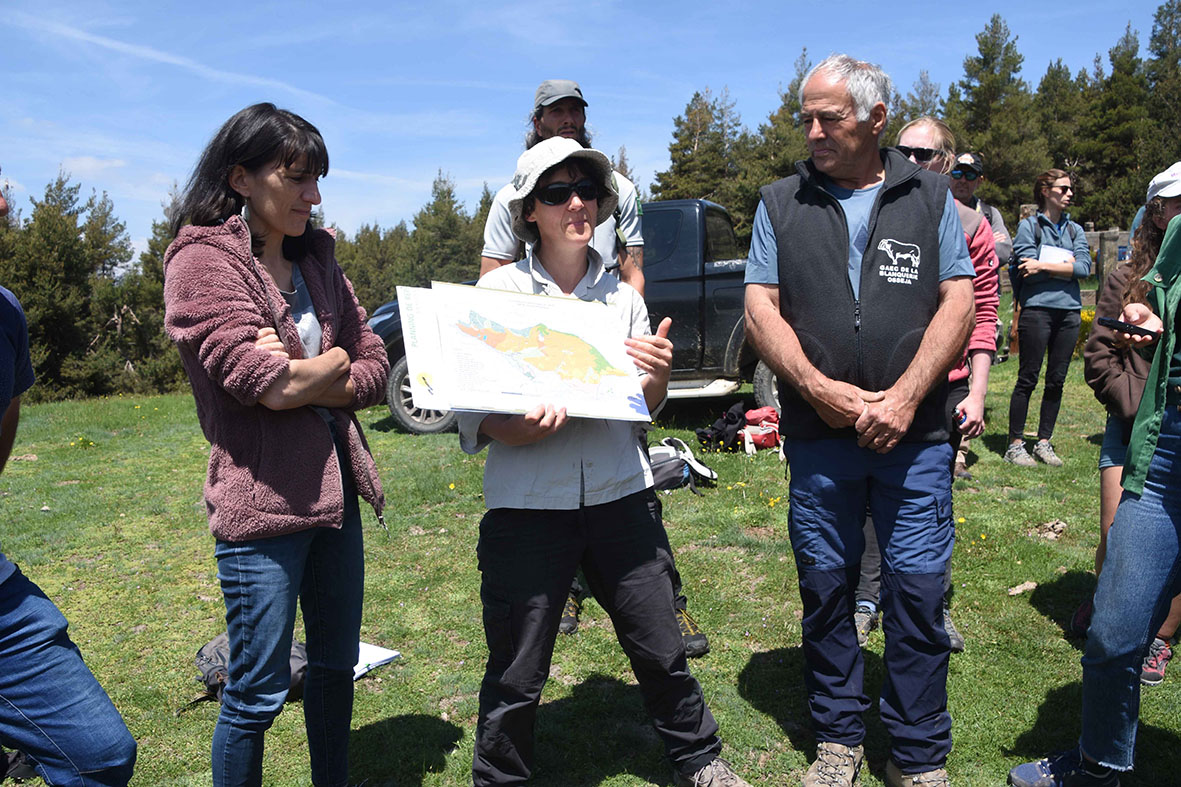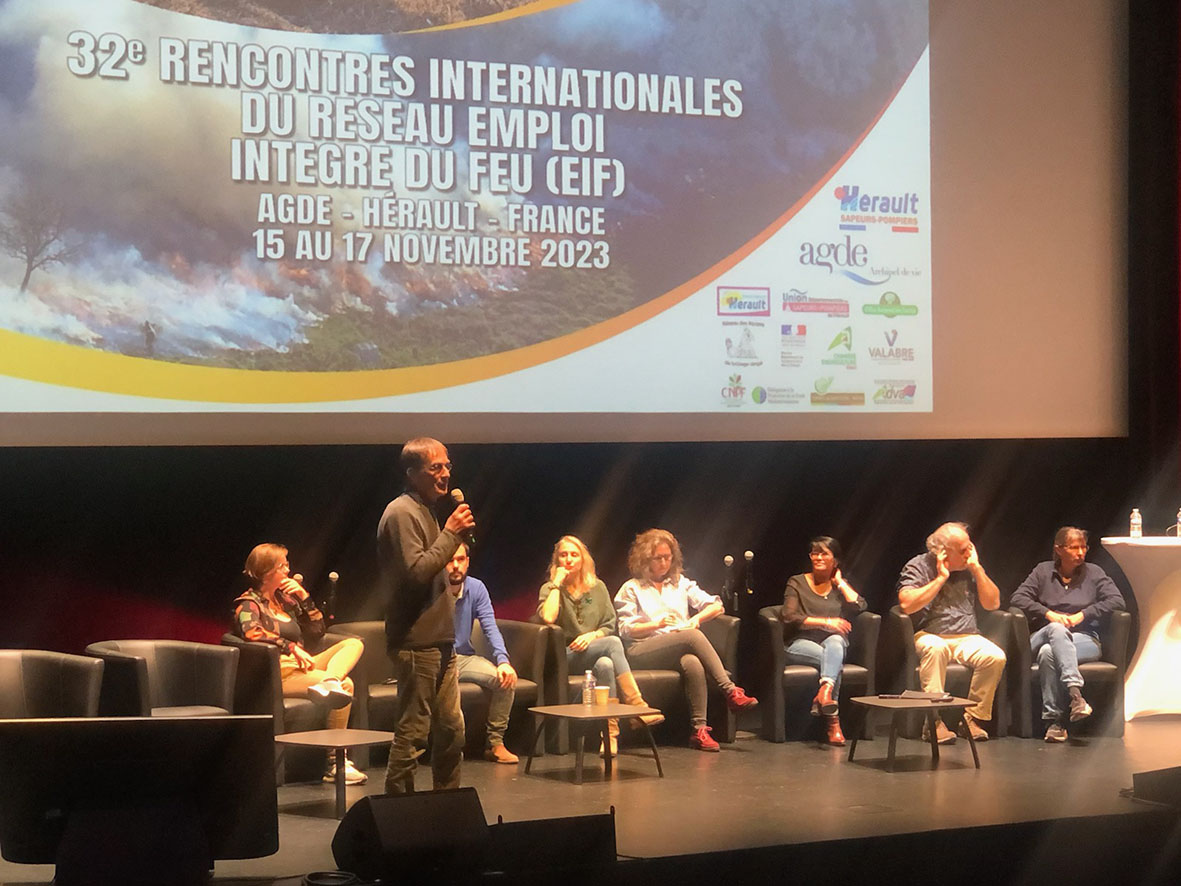
TRAININGS
STUDY AREA OF FRANCE

Technical exchange days
Technical exchange days of the Pyrenean Pastoral Network
On 14, 15 and 16 June 2023, the technical exchange days of the Pyrenean Pastoral Network were held in the Pyrénées-Orientales, in Fuilla, Osséja and La Trinité, on the theme "Pastoral burning and fire prevention in the Pyrenees-Orientales". Around twenty people took part, mainly members of the various departments involved in the pastoral network, as well as Marion Morel and Jean-Paul Métailié from GEODE, as representatives of the IRIS project. The meeting was organised by the Society of Stockbreeders of the Eastern Pyrenees (Société d'Élevage des Pyrénées-Orientales; SEPO).
The first half-day was devoted to presentations on research works (GEODE, SEPO, CA 64), in particular with a return to the "Open2preserve" programme (which will end at the end of 2021) (Jean-Paul Métailié) and a presentation of the participatory mapping work carried out as part of the IRIS project in the commune of Enveitg (Marion Morel).
The second day was devoted to the organisation and evaluation of the burning of pastures in the Pyrénées-Orientales. A general analysis was made by the institutions involved in the department (SEPO, DDTM 66, cell BD 66). The day continued on the field of the commune of Osséja, with a presentation by the Soula d'Osséja Pastoral Group on the use of burning and its effects. On the third day, the participants travelled to the Trinité site (commune of Prunet-et-Belpuig) in the Aspres massif, where a large DFCI system is managed by SEPO and local breeders. The discussion enabled a comparison to be made between the departmental policy of the DFCI and the testimonies of the breeders.
These days showed the convergence of the various participants on the interest of the Association of Livestock Breeders and Controlled Burning in local DFCI policies in the Mediterranean area and beyond.
(Report and photography: Jean-Paul Métailié)
The place of fire in the history of landscapes

Round tables
32nd Meeting of the Integrated Fire Employment Network (REIF)
In 2023, the GEODE team also took part in the 32nd meeting of the Integrated Fire Employment Network (REIF), held in Agde (Hérault) from 15 to 17 November. The REIF is the successor of the "Prescribed Burning Network", created in 1990, whose objective was to establish relations between practitioners in the field of burning and fire-fighting (fire and rescue services, foresters - engineers from the ONF, civil security), researchers working on the subject (INRA, CNRS) and local stakeholders (pastoralists, departmental territorial directorates, chambers of agriculture, etc.).
The members of GEODE have regularly participated in various meetings since 1990. Over the years, and with the institutionalisation of prescribed burning, participation in the meetings has increased steadily, in particular due to the obligation for all personnel participating in training on prescribed burning to attend at least one meeting. In 2023, almost 300 people, including around 20 from Spain and Italy, attended the meetings in Agde. It should be noted, however, that the participation of scientists has fallen sharply over the last decade, which is indicative of a decline in research on the subject in France.
The first day of the meetings was mainly devoted to the use of "tactical fires" (counter fires), which practitioners now consider to be one of the most important firefighting techniques, particularly in the case of "mega fires". "These fires make traditional extinguishing techniques obsolete.
The second day was dedicated to the integrated use of fire in the form of 3 round tables (modalities and interests of the use of fire; fire risks, planning and social issues; support for the practice of pastoral burning) in which GEODE members participated. In particular, Vanessa Py-Saragaglia presented the IRIS project results and the concept of "living heritage" applicated to controlled burning and the Enveigt study area. Solène Havard presented a summary of her current thesis. The use of fire in Spain (Catalonia) and Italy was then the subject of a presentation.
The last half-day was dedicated to network news. The REIF facilitators are aware of the importance of maintaining the participation of scientists in the network, which is why the agenda for the second day was dominated by research-related topics.
(Report: Jean-Paul Métailié and photography: Solène Havard)